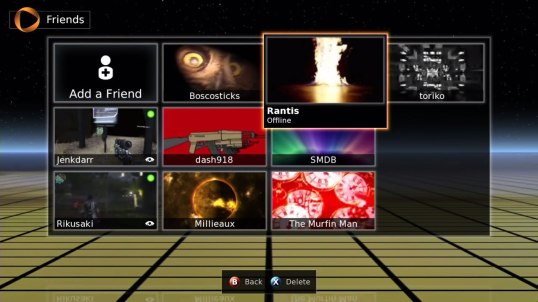It seems like you guys are going to be facing the same kind of multiplatform proposition that happens with titles do like Call of Duty: Black Ops. A consumer with two consoles can get one for the PS3, or get one for the Xbox 360, but most of my social gameplay happens on the 360. That’s because Xbox Live and its bigger user base. So, how would you guys entice players to either import their same friendships and relationships from another platform onto OnLive?
I think social networks, in general, I think they come with time. And one of the ways we are doing it is we’re doing something that’s never been done before with other console platforms, is rather than saying we’re a direct competitor to Xbox or Playstation, what we’re doing is encouraging people to use OnLive as an adjunct to those platforms.
We get compensated a little bit by the publisher when someone runs a demo, so that’s all fine from a business model point of view. I think over time, people are going to say, let’s see, I’m using OnLive more and more, and I’m building my friendships on OnLive. Because people friend you while you’re playing a demo and they can spectate you and you can spectate them, et cetera. And we’ll be adding other features like leader boards and contests and things. So, I view it as something that’s more or less organic. We want to encourage people to not feel like it’s either/or.
But rather see it as something you do was well. In time, we’ll see. If we build a big enough base that people see as the next Xbox Live social point of view, that’s great. If we don’t, then we end up being an adjunct, that’s an OK place to be too. We are a start-up. We don’t have a multi-billion dollar overhead.
There’s no mega-corporation behind you…
For Xbox and Playstation, those are huge, huge, huge engagements to get those things off the ground. Not to say that OnLive, as start-ups go, is bit of a jumbo start-up, I guess. But, still, I mean, geez, all the money we’ve used is a fraction of what Microsoft spent on just its marketing campaign. We just announced this flat-rate plan and people are beginning to see us as the NetFlix of gaming. We want to be that. That’s not a bad place to be. It really isn’t.
I wanted to talk about that pricing announcement in particular, because that’s a huge game changer. Your pricing’s changed in two or three different ways. First, was the monthly subscription fee. And then, on top of that was going to be the à la carte play-pass for each game. Then you guys got rid of those subscription fees all together and went strictly a la carte. Now, there’s another option, where you basically have an all-you-can-eat monthly pass.
So, how did those conversations go with the publishers? And can you give me a sense of how enthusiastic or reluctant they were? Was something like this always part of your strategic planning?
So it was always something we had asked, and the publishers were worried that this wouldn’t work before they saw the economics of it. So, the beginning part of your question where you were talking about the evolution of pricing. What you’re seeing is the invention of a new paradigm. If we were a large company, then we could go and take a gamble and say, “OK, it’s going to be this price before we have any real data as to what usage patterns are.” But you can’t do that as a start-up. You’ve got to make sure that the money that comes in is at least a little bit more than the money that goes out.
So, when we were doing the beta, we had our data from the beta, but we also had analysts data showing usage patterns and monthly expenditures and so on, and we worked from that. Then, we had to come up with a very conservative price, under which we could continue to run the business. That turned out to be would be $14.95 a month. But we also announced that we were going to make it available for free initially. The free trial gave us enough runway to go and find out what the actual data was going to be. How many hours people were putting in? When are they putting it in? What class of servers do they need depending on the mix of games? And how much are they spending every month on games? So, with that data, we were able to then go and say, “OK, now that we can be confident that these are the patterns and usage patterns,” and this is why we don’t have to charge a base monthly fee for this for OnLive anymore.
And take a look at the games in our back catalog. They are great games. Don’t get me wrong. But as far as the publishers are concerned, they can’t monetize them in anyway anymore. It used to be they would have those games at bargain bin prices. But there are no bargain bins anymore.
(More on TIME.com: OnLive Cloud Gaming Service Kills Monthly Fees Permanently)


